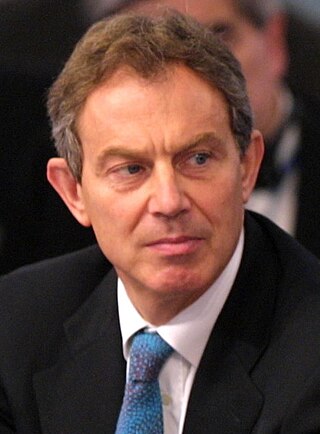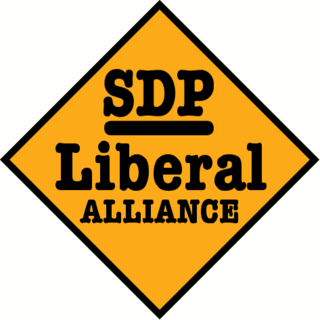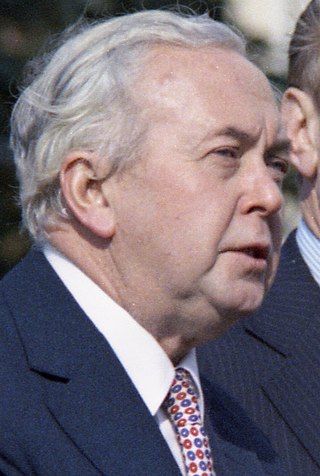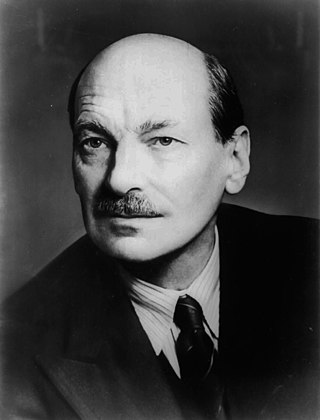| Opinion polling for UK general elections |
|---|
| 1997 election |
| Opinion polls |
| 2001 election |
| Opinion polls |
| 2005 election |
| Opinion polls |
| 2010 election |
| Opinion polls |
| 2015 election |
| Opinion polls • Leadership approval |
In the run up to the general election of 2005, several polling organisations carried out opinion polling in regards to voting intention in Great Britain (i.e. the UK excluding Northern Ireland, which is usually excluded from such voting intention surveys). Results of such polls are displayed below.
The election took place on 5 May 2005. The previous general election was held on 7 June 2001.
Since each MP is elected separately by the first past the post voting system, it is impossible to precisely project a clear election outcome from overall national shares of the vote. Not only can individual constituencies vary markedly from overall voting trends, but individual countries and regions within the nation may have a very different electoral contest that is not properly reflected in overall share of the vote figures.
Therefore, the first past the post system means that the number of MPs elected may not reflect the overall popular vote share across the parties. Thus, it is not necessarily the party with the largest share of the popular vote that ends up with the largest number of MPs. (See details of the elections in 1951 and Feb 1974) Since 1935 no party has achieved more than 50% of the popular vote in a British general election. The voting system favours parties with relatively concentrated support: a widely distributed vote leaves a party at risk of getting a large vote share but doing poorly in terms of numbers of seats (as the SDP–Liberal Alliance did in the 1980s), whereas parties with localised votes can win seats with a relatively small share of the vote.
That said, in previous elections, approximate forecasting of results were achieved by assuming that the swing in each individual constituency will be the same across the country. This system, known as uniform national swing (UNS) is used by much of the media in Britain to assess and extrapolate electoral fortunes from opinion poll data, though there has been criticism that such predictions may be naive and unreliable, even from providers of such data. [1]
Normally governments can easily survive for a full parliamentary term on a majority of more than 20 seats over all other parties. Below that level there is a danger of by-elections and MPs crossing the floor of the House reducing the government to a minority such that it would be at increased risk of losing a vote of no confidence.
The 2001 general election, which had the lowest turnout of any general election for more than 80 years, saw the Labour government of Tony Blair re-elected with a second successive landslide majority, which left the political landscape almost completely unchanged. William Hague resigned as leader of a Conservative opposition which failed to make any real progress from its heavy defeat in 1997, and was succeeded by Iain Duncan Smith.
The Labour government remained ascendant in the opinion polls, but its popularity began to suffer from Mar 2003 as a result of Tony Blair's decision to send British forces to collaborate with the American forces in their invasion of Iraq, which led to the end of Saddam Hussein's dictatorship, as well as his eventual capture, trial and execution by a new democratic Iraqi government. However, there was a public outcry that the invasion of Iraq failed to uncover weapons of mass destruction which had long been believed to exist in Iraq. By the summer of 2003, several opinion polls were showing a narrow Conservative lead for the first time since the fuel protests of 2000, and the Liberal Democrats were also shown to be enjoying a surge in support, largely seen to be the result of Charles Kennedy's anti-war stance.
However, opinion polls showed that Iain Duncan Smith was not a popular choice with voters as a potential prime minister, and there was also the fact that Labour still had a huge parliamentary majority, while the Tories would have to almost double their share of seats in parliament to form a majority. Duncan Smith was ousted as leader in Nov 2003 following a vote of no confidence by his own party, was succeeded uncontested by the former Home Secretary Michael Howard, who helped the Tories keep close behind Labour in the opinion polls and oversaw strong showings in the local council and European parliament by-elections of 2004.
A general election was called for 5 May 2005, with Labour winning for a third successive time, but its majority dropped from 160 seats to 66 seats, with both the Conservatives and Liberal Democrats enjoying substantial gains.
Tony Blair had already decided that the 2005 general election would be the last he would contest as Labour Party leader if re-election was achieved. Michael Howard announced his resignation shortly afterwards, feeling that he was too old to lead the party into the next general election (knowing that it was unlikely to be held until he was almost 70 years old), and Charles Kennedy stepped down eight months later following revelations about his personal life.
Poll results are initially listed in reverse chronological order showing the most recent first, using the date the fieldwork was undertaken, as opposed to the date of publication.
The figure given in the 'lead' column is the lead held by Labour or the Conservatives over the second placed of the two parties.
| Pollster | Client | Dates conducted | Sample size | Lab | Con | Lib Dem | Others | Lead |
|---|---|---|---|---|---|---|---|---|
| 2005 general election | 5 May | – | 36.2% | 33.2% | 22.7% | 7.9% | 2.0% | |
| Ipsos MORI | Evening Standard | 3–4 May | 1,164 | 38% | 33% | 23% | 6% | 5% |
| Populus | The Times | 2–3 May | 1,174 | 38% | 32% | 21% | 8% | 6% |
| ICM | The Guardian | 1–3 May | 1,178 | 38% | 32% | 22% | 8% | 6% |
| Populus | The Times | 29 Apr – 2 May | 866 | 41% | 27% | 23% | 9% | 14% |
| Populus | The Times | 27–30 Apr | 863 | 42% | 29% | 21% | 8% | 13% |
| Populus | The Times | 25–28 Apr | 853 | 40% | 31% | 22% | 7% | 9% |
| Populus | The Times | 24–27 Apr | 841 | 40% | 31% | 21% | 8% | 9% |
| ICM | The Guardian | 24–26 Apr | 1,209 | 40% | 32% | 21% | 5% | 8% |
| Populus | The Times | 23–26 Apr | 835 | 40% | 31% | 21% | 8% | 9% |
| Populus | The Times | 22–25 Apr | 831 | 40% | 31% | 21% | 8% | 9% |
| Populus | The Times | 21–24 Apr | 819 | 41% | 33% | 19% | 7% | 8% |
| Populus | The Times | 20–23 Apr | 798 | 41% | 32% | 20% | 7% | 9% |
| Populus Online | The Times Online | 19–22 Apr | 798 | 41% | 33% | 20% | 6% | 8% |
| Populus | The Times | 18–21 Apr | 806 | 40% | 33% | 20% | 7% | 7% |
| Populus | The Times | 17–20 Apr | 836 | 39% | 34% | 20% | 7% | 5% |
| ICM | The Guardian | 17–19 Apr | 1,163 | 39% | 33% | 22% | 7% | 6% |
| Populus | The Times | 16–19 Apr | 863 | 39% | 33% | 21% | 7% | 6% |
| Populus | The Times | 14–17 Apr | 586 | 40% | 31% | 21% | 8% | 9% |
| ICM | The Guardian | 10–12 Apr | 1,169 | 39% | 33% | 22% | 7% | 6% |
| ICM | The Guardian | 1–3 Apr | 973 | 37% | 34% | 21% | 8% | 3% |
| Populus | The Times | 1–3 Apr | 812 | 37% | 35% | 19% | 9% | 2% |
| ICM | The Guardian | 18–20 Mar | 716 | 40% | 32% | 20% | 7% | 8% |
| Populus | The Times | 4–6 Mar | 831 | 39% | 32% | 20% | 9% | 7% |
| ICM | The Guardian | 18–20 Feb | 1,013 [2] | 37% | 34% | 21% | 8% | 3% |
| Populus | The Times | 4–6 Feb | 814 | 41% | 32% | 18% | 9% | 9% |
| ICM | The Guardian | 21–23 Jan | 1,000 [2] | 38% | 31% | 21% | 9% | 6% |
| Populus | The Times | 7–9 Jan | 848 | 38% | 33% | 20% | 9% | 5% |
| Pollster | Client | Dates conducted | Sample size | Lab | Con | Lib Dem | Others | Lead |
|---|---|---|---|---|---|---|---|---|
| ICM | The Guardian | 16–19 Dec | 1,002 [2] | 40% | 31% | 21% | 7% | 9% |
| Populus | The Times | 3–5 Dec | 826 | 37% | 33% | 20% | 10% | 4% |
| ICM | The Guardian | 12–14 Nov | 830 | 38% | 30% | 22% | 10% | 8% |
| ICM | The Guardian | 22–24 Oct | 1,011 | 37% | 31% | 23% | 9% | 6% |
| YouGov | The Daily Telegraph | 21–23 Sep | 2,033 | 36% | 34% | 21% | 9% | 2% |
| ICM | The Guardian | 17–19 Sep | 1,005 | 36% | 32% | 22% | 10% | 4% |
| Populus | The Times | 2–5 Sep | 608 | 31% | 30% | 26% | 13% | 1% |
| ICM | The Guardian | 13–15 Aug | 1,005 | 36% | 33% | 22% | 9% | 3% |
| Populus | The Times | 30 Jul – 1 Aug | 570 | 32% | 32% | 24% | 12% | Tie |
| ICM | The Guardian | 16–18 Jul | 1,007 | 35% | 30% | 25% | 10% | 5% |
| Populus | The Times | 2–3 Jul | 556 | 33% | 29% | 24% | 14% | 4% |
| Ipsos MORI | Financial Times | 18–20 Jun | 966 | 32% | 27% | 22% | 19% | 6% |
| ICM | The Guardian | 11–13 Jun | 1,009 | 34% | 31% | 22% | 13% | 3% |
| 2004 European election | ||||||||
| Populus | The Times | 4–6 Jun | 589 | 31% | 29% | 22% | 18% | 3% |
| ICM | The Guardian | 20–23 May | 1,001 | 39% | 34% | 20% | 7% | 5% |
| Populus | The Times | 7–9 May | 578 | 32% | 36% | 22% | 10% | 4% |
| ICM | The Guardian | 16–18 Apr | 1,002 | 38% | 33% | 22% | 6% | 5% |
| ICM | The Guardian | 10–11 Mar | 1,014 | 37% | 35% | 21% | 7% | 2% |
| Populus | The Times | 5–7 Mar | 573 | 36% | 34% | 22% | 8% | 2% |
| ICM | The Guardian | 20–22 Feb | 1,006 | 36% | 34% | 21% | 8% | 2% |
| Populus | The Times | 6–8 Feb | 580 | 36% | 31% | 25% | 8% | 5% |
| ICM | The Guardian | 16–18 Jan | 1,007 | 39% | 34% | 20% | 7% | 5% |
| Populus | The Times | 2–4 Jan | 566 | 40% | 35% | 18% | 7% | 5% |
| Pollster | Client | Dates conducted | Sample size | Lab | Con | Lib Dem | Others | Lead |
|---|---|---|---|---|---|---|---|---|
| ICM [3] | The Guardian | 12–14 Dec | 1,001 | 38% | 33% | 21% | 8% | 5% |
| Populus | The Times | 5–7 Dec | 557 | 35% | 33% | 22% | 10% | 2% |
| ICM [3] | The Guardian | 14–16 Nov | 1,002 | 38% | 33% | 21% | 8% | 5% |
| Populus | The Times | 7–9 Nov | 554 | 35% | 31% | 24% | 10% | 4% |
| Michael Howard elected Conservative Party leader | ||||||||
| ICM [3] | The Guardian | 17–19 Oct | 1,004 | 38% | 33% | 21% | 8% | 5% |
| Populus | The Times | 3–5 Oct | 524 | 36% | 28% | 27% | 9% | 8% |
| YouGov | The Daily Telegraph | 23–25 Sep | 2,306 | 31% | 32% | 30% | 7% | 1% |
| ICM | The Guardian | 19–21 Sep | 1,002 | 35% | 30% | 28% | 8% | 5% |
| Populus | The Times | 5–6 Sep | 511 | 37% | 35% | 20% | 8% | 2% |
| ICM | The Guardian | 15–17 Aug | 1,001 | 37% | 32% | 22% | 9% | 5% |
| Populus | The Times | 1–3 Aug | 564 | 35% | 33% | 25% | 7% | 2% |
| YouGov | The Daily Telegraph | 22–24 Jul | 2,219 | 34% | 37% | 22% | 7% | 3% |
| ICM | The Guardian | 18–20 Jul | 1,003 | 36% | 34% | 22% | 9% | 2% |
| ICM | The Guardian | 20–22 Jun | 1,001 | 38% | 34% | 21% | 7% | 4% |
| Populus | The Times | 13–15 Jun | 513 | 36% | 34% | 21% | 9% | 2% |
| ICM | The Guardian | 16–18 May | 1,000 | 42% | 29% | 21% | 8% | 13% |
| Populus | The Times | 2–4 Mar | 565 | 35% | 34% | 23% | 8% | 1% |
| YouGov | The Daily Telegraph | 22–24 Apr | 2,390 | 40% | 32% | 21% | 7% | 8% |
| ICM | The Guardian | 17–19 Apr | 1,000 | 42% | 30% | 21% | 7% | 12% |
| YouGov | The Daily Telegraph | 26–27 Mar | 2,282 | 40% | 33% | 20% | 7% | 7% |
| Populus | The Times | 10–12 Mar | 540 | 42% | 29% | 22% | 7% | 13% |
| ICM | The Guardian | 14–16 Mar | 1,002 | 38% | 32% | 24% | 6% | 6% |
| Populus | The Times | 7–9 Mar | 498 | 34% | 34% | 24% | 8% | Tie |
| ICM | The Guardian | 14–16 Feb | 1,003 | 39% | 31% | 22% | 8% | 8% |
| Populus | The Times | 7–9 Feb | 555 | 35% | 34% | 25% | 6% | 1% |
| YouGov | The Daily Telegraph | 28–30 Jan | 1,949 | 36% | 32% | 24% | 8% | 4% |
| ICM | The Guardian | 17–19 Jan | 1,002 | 43% | 30% | 21% | 6% | 13% |
| Populus | The Times | 3–5 Jan | 565 | 38% | 31% | 25% | 6% | 7% |
| Pollster | Client | Dates conducted | Sample size | Lab | Con | Lib Dem | Others | Lead |
|---|---|---|---|---|---|---|---|---|
| ICM | The Guardian | 13–15 Dec | 1,006 | 41% | 27% | 23% | 8% | 14% |
| ICM | The Guardian | 15–17 Nov | 1,000 | 42% | 29% | 22% | 7% | 13% |
| ICM | The Guardian | 18–20 Oct | 1,001 | 43% | 32% | 20% | 6% | 11% |
| Populus | The Times | 11–13 Oct | 1,001 | 42% | 30% | 21% | 6% | 12% |
| ICM | The Guardian | 20–22 Sep | 1,000 | 39% | 34% | 20% | 7% | 5% |
| Populus | The Times | 5–7 Sep | 610 | 39% | 33% | 21% | 6% | 6% |
| ICM | The Guardian | 23–25 Aug | 1,003 | 41% | 32% | 21% | 6% | 9% |
| ICM | The Guardian | 26–27 Jul | 1,002 | 42% | 33% | 20% | 4% | 9% |
| ICM | The Guardian | 21–23 Jun | 1,002 | 42% | 32% | 20% | 7% | 10% |
| ICM | The Guardian | 17–19 May | 1,003 | 42% | 34% | 19% | 5% | 8% |
| ICM | The Guardian | 20–21 Apr | 1,000 | 45% | 29% | 18% | 8% | 16% |
| ICM | The Guardian | 15–17 Mar | 1,001 | 43% | 34% | 17% | 6% | 9% |
| ICM | The Guardian | 15–17 Feb | 1,003 | 47% | 30% | 18% | 5% | 17% |
| ICM | The Guardian | 18–20 Jan | 1,003 | 45% | 30% | 19% | 6% | 15% |
| Pollster | Client | Dates conducted | Sample size | Lab | Con | Lib Dem | Others | Lead |
|---|---|---|---|---|---|---|---|---|
| ICM | The Guardian | 14–16 Dec | 1,000 | 44% | 29% | 20% | 7% | 15% |
| ICM | The Guardian | 16–18 Nov | 1,004 | 46% | 29% | 19% | 6% | 17% |
| ICM | The Guardian | 19–20 Oct | 1,000 | 47% | 29% | 19% | 5% | 18% |
| ICM | The Guardian | 14–16 Sep | 1,007 | 46% | 29% | 20% | 5% | 17% |
| ICM | The Guardian | 17–19 Aug | 1,004 | 46% | 30% | 17% | 7% | 16% |
| ICM | The Guardian | 13–14 Jul | 1,001 | 46% | 30% | 18% | 6% | 16% |
| 2001 general election | 7 Jun | – | 42.0% | 32.7% | 18.8% | 6.5% | 9.3% | |

The 2001 United Kingdom general election was held on Thursday 7 June 2001, four years after the previous election on 1 May 1997, to elect 659 members to the House of Commons. The governing Labour Party was re-elected to serve a second term in government with another landslide victory with a 167-seat majority, returning 412 members of Parliament versus 418 from the 1997 general election, a net loss of six seats, though with a significantly lower turnout than before—59.4%, compared to 71.6% at the previous election. The number of votes Labour received fell by nearly three million. Tony Blair went on to become the only Labour Prime Minister to serve two consecutive full terms in office. As Labour retained almost all of their seats won in the 1997 landslide victory, the media dubbed the 2001 election "the quiet landslide".

The 1997 United Kingdom general election was held on Thursday, 1 May 1997. The governing Conservative Party led by Prime Minister John Major was defeated in a landslide by the Labour Party led by Tony Blair, achieving a 179-seat majority and a total of 418 seats, the highest ever won by Labour.

The 1983 United Kingdom general election was held on Thursday 9 June 1983. It gave the Conservative Party under the leadership of Margaret Thatcher the most decisive election victory since that of the Labour Party in 1945, with a majority of 144 seats and the first of two consecutive landslide victories.

The 1992 United Kingdom general election was held on Thursday 9 April 1992, to elect 651 members to the House of Commons. The election resulted in the fourth consecutive victory for the Conservative Party since 1979, with a majority of 21 and would be the last time that the Conservatives would win an overall majority at a general election until 2015. It was also the last general election to be held on a day which did not coincide with any local elections until 2017. This election result took many by surprise, as opinion polling leading up to the election day had shown a narrow but consistent lead for the Labour Party under leader Neil Kinnock.

The SDP–Liberal Alliance was a centrist and social liberal political and electoral alliance in the United Kingdom.

The February 1974 United Kingdom general election was held on Thursday 28 February 1974. The Labour Party, led by Leader of the Opposition and former Prime Minister Harold Wilson, gained 14 seats but was seventeen short of an overall majority. The Conservative Party, led by incumbent Prime Minister Edward Heath, lost 28 seats. That resulted in a hung parliament, the first since 1929. Heath sought a coalition with the Liberals, but the two parties failed to come to an agreement and so Wilson became Prime Minister for a second time, his first with a minority government. Wilson called another early election in September, which was held in October and resulted in a Labour majority. The February election was also the first general election to be held with the United Kingdom as a member state of the European Communities (EC), which was widely known as the "Common Market".

Sheffield Hallam is a constituency represented in the House of Commons of the UK Parliament since 2019 by Olivia Blake of the Labour Party.

The 1945 United Kingdom general election was a national election held on Thursday 5 July 1945, but polling in some constituencies was delayed by some days, and the counting of votes was delayed until 26 July to provide time for overseas votes to be brought to Britain. The governing Conservative Party sought to maintain its position in Parliament but faced challenges from public opinion about the future of the United Kingdom in the post-war period. Prime Minister Winston Churchill proposed to call for a general election in Parliament, which passed with a majority vote less than two months after the conclusion of the Second World War in Europe.

The 1959 United Kingdom general election was held on Thursday, 8 October 1959. It marked a third consecutive victory for the ruling Conservative Party, now led by Prime Minister Harold Macmillan. For the second time in a row, the Conservatives increased their overall majority in Parliament, this time to a landslide majority of 100 seats, having gained 20 seats for a return of 365. The Labour Party, led by Hugh Gaitskell, lost 19 seats and returned 258. The Liberal Party, led by Jo Grimond, again returned only six MPs to the House of Commons, but managed to increase its overall share of the vote to 5.9%, compared to just 2.7% four years earlier.

The 1945 Canadian federal election was held on June 11, 1945, to elect members of the House of Commons of the 20th Parliament of Canada. Prime Minister William Lyon Mackenzie King's Liberals won a third term. The party fell five seats short of a majority but was able to rule as a majority government with the support of Independent Liberal MPs.

The 2005 United Kingdom general election was held on Thursday 5 May 2005, to elect 646 members to the House of Commons. The governing Labour Party, led by Tony Blair, won its third consecutive victory, with Blair becoming the second Labour leader after Harold Wilson to form three majority governments. However, its majority fell to 66 seats; the majority it won four years earlier had been of 167 seats. This would be the last election not won by the Conservative Party as of 2024. This was the first time the Labour Party had won a third consecutive election, and as of the 2024 general election remains the party's most recent general election victory.

The 2010 United Kingdom general election was held on Thursday 6 May 2010, with 45,597,461 registered voters entitled to vote to elect members to the House of Commons. The election took place in 650 constituencies across the United Kingdom under the first-past-the-post system.

"Shy Tory factor" is a name given by British opinion polling companies to a phenomenon first observed by psephologists in the early 1990s. They observed that the share of the electoral vote won by the Conservative Party was significantly higher than the equivalent share in opinion polls. The accepted explanation was that so-called "shy Tories" were voting Conservative after telling pollsters they would not. The general elections held in 1992 and 2015 are examples where it has allegedly affected the overall results, but has also been discussed in other elections where the Conservatives did unexpectedly well. It has also been applied to the success of the Republican Party in the United States or the continued electoral victories of the People's Action Party in Singapore.
In the run-up to the general election of 2010, several polling organisations carried out opinion polling in regards to voting intention in Great Britain. Results of such polls are displayed below.

In the run up to the general election on 7 May 2015, various organisations carried out opinion polling to gauge voting intention. Results of such polls are displayed in this article. Most of the polling companies listed are members of the British Polling Council (BPC) and abide by its disclosure rules.
Prior to the 2015 general election, various polling organisations conducted opinion polling in specific constituencies. The results of publicised opinion polling for individual constituencies are detailed in this article. However, most opinion polling covers Great Britain, where the results are published in this article here.

The 2015 United Kingdom general election was held on Thursday 7 May 2015 to elect 650 Members of Parliament to the House of Commons. It was the only general election held under the rules of the Fixed-term Parliaments Act 2011 and was the last general election to be held before the United Kingdom would vote to end its membership of the European Union (EU). Local elections took place in most areas of England on the same day.
In the run-up to the general election on 8 June 2017, various organisations carried out opinion polling to gauge voting intentions. Results of such polls are displayed in this article. Most of the polling companies listed are members of the British Polling Council (BPC) and abide by its disclosure rules.
Prior to the 2019 United Kingdom general election, various organisations carried out opinion polling to gauge voting intentions. Results of such polls are displayed in this list. Most of the pollsters listed are members of the British Polling Council (BPC) and abide by its disclosure rules. Opinion polling about attitudes to the leaders of various political parties can be found in a separate article.
Opinion polling for the 2024 United Kingdom general election is being carried out continually by various organisations to gauge voting intention. Most of the polling companies listed are members of the British Polling Council (BPC) and abide by its disclosure rules. The dates for these opinion polls range from the 2019 general election on 12 December to the present day.